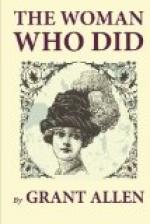When she had finished that note, and folded it reverently with kisses and tears, she wrote the second one in a firm hand for the formal evidence. Then she put on a fresh white dress, as pure as her own soul, like the one she had worn on the night of her self-made bridal with Alan Merrick. In her bosom she fastened two innocent white roses from Walter Brydges’s bouquet, arranging them with studious care very daintily before her mirror. She was always a woman. “Perhaps,” she thought to herself, “for her lover’s sake, my Dolly will kiss them. When she finds them lying on her dead mother’s breast, my Dolly may kiss them.” Then she cried a few minutes very softly to herself; for no one can die without some little regret, some consciousness of the unique solemnity of the occasion.
At last she rose and moved over to her desk. Out of it she took a small glass-stoppered phial, that a scientific friend had given her long ago for use in case of extreme emergency. It contained prussic acid. She poured the contents into a glass and drank it off. Then she lay upon her bed and waited for the only friend she had left in the world, with hands folded on her breast, like some saint of the middle ages.
Not for nothing does blind fate vouchsafe such martyrs to humanity. From their graves shall spring glorious the church of the future.
When Dolores came in next morning to say good-by, she found her mother’s body cold and stiff upon the bed, in a pure white dress, with two crushed white roses just peeping from her bodice.
Herminia Barton’s stainless soul had ceased to exist forever.
The end.



